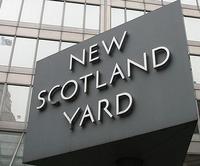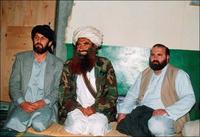-
Israel not invited to a counter-terror forum in Turkey

The Global Counterterrorism Forum (GCTF), established by the Obama administration in September 2011, held its first day of discussions in Ankara, Turkey, last Friday; twenty-nine countries have been invited to join the forum, ten of which are Arab or Muslim countries – but Turkey vetoed the invitation of Israel, and the United States accepted Turkey’s position
-
-
U.S. readies counter-terror offensive in east Africa

Yesterday the U.S. State Department announced rewards totaling $33 million for information about the location of seven key leaders of Somalia’s al Shabaab Islamic militant group, seeking for the first time to target the top leadership of that organization; the increasingly precise, and increasingly lethal, U.S. drone campaign against al Qaeda and al Qaeda-affiliated organizations in Pakistan, a campaign which has killed hundreds of Islamic militants and dozens of their leaders, owes its success to one thing: good intelligence; the United States is now increasing its anti-terrorist intelligence collection efforts in Africa
-
-
U.S. drones take out al Qaeda’s second in command

In another impressive coup for the U.S. campaign against al Qaeda, missiles launched from a CIA drone Monday morning killed Abu Yahya al-Libi, al Qaeda’s second in command; the killing of al-Libbi closes a circle: following bin Laden’s death, five high-level al Qaeda operatives were considered as potential successors; since last August, the United States has taken out four of them — Ilyas Kashmiri, Abdul Rahman Atiya, Anwar al Awlaki; and now al-Libi; the killing of al-Libi is but the latest manifestation of how the Obama administration has intensified and expanded the campaign against al Qaeda and its affiliates
-
-
Insuring against Olympic cancelation
Starting on 27 July, the 2012 Olympic Games in London will see more than 10,000 athletes from nearly 200 different nations compete in 302 disciplines; nine million spectators are expected at the competition venues, while between three and four billion people will follow the spectacle on television; if the Games were called off as a result of terrorist act or another disaster, Munich Re would provide cover of around 350 million euros through several policies
-
-
Break-away Mali region now under al Qaeda-affiliate control
Following a March 2012 military coup in Mali, Tuareg secessionists in northeast Mali have seized two-thirds of that country — an area larger than France — and proclaimed the Independent State of Azawad; things have not gone as planned: three months after secession, an al Qaeda-affiliated Islamist fundamentalist movement, Ansar Dine, is in control of the vast territory; the Financial Times observes: “[W]hat initially appeared to be a quest for a secular homeland has turned into something much more dangerous, for Mali and far beyond: the possibility of an Islamist-aligned mini-state that could offer a base to the jihadist groups and criminal gangs that roam the Sahara”
-
-
King blasts Obama administration over bin Laden operation movie

On Wednesday, Representative Peter King (R-New York), chairman of the House Committee on Homeland Security, issued a statement scathingly critical of the Obama administration after the release of internal CIA and Department of Defense e-mail messages related to the planned Sony Pictures movie on the mission in which U.S. Special Operations Forces killed Osama bin Laden; King says that there was an “extremely close, unprecedented, and potentially dangerous collaboration” between the film makers and top officials at the CIA, DoD, and the White House
-
-
King urges full FBI investigation into AQAP operation leaks
In a letter to FBI director Robert Mueller, King asks that investigation encompass “everyone who had access to this vital information”; King says at least three aspects of the leak are highly disturbing: “(a) the lives of a unique intelligence source and others may have been jeopardized; (b) the operation had to be aborted before its potential was maximized; and (c) critical intelligence relationships have been damaged”
-
-
More arrested on terrorism charges in Chicago
The number of anti-NATO protesters arrested on terrorism-related charges has risen to five; three were arrested last Wednesday, and the police found Molotov cocktails and other weapons in the apartment of one of them; the other two were arrested for making terrorist threats; lawyers for those arrested charge that law-enforcement engaged in entrapment
-
-
U.S. security agents have 20,000 contacts a year with people on terrorist watch lists
U.S. law enforcement and security agencies encounter, on average, fifty-five “known or suspected terrorists” a day — at airports, border crossings, ports, and more; this means that U.S. security agencies have more than 20,000 contacts per year with known or suspected terrorists
-
-
Bios of female terrorists contradict stereotypes: study

Much like their male counterparts, female terrorists are likely to be educated, employed, and native residents of the country where they commit a terrorist act, new research finds
-
-
U.K. faces problem of security service members with links to terrorism

Abdul Rahman, a 33-year old Scotland Yard constable of Bangladeshi descent, had his security clearance revoked in 2006 — he chose to resign rather than be dismissed — following an MI5 investigation which concluded that, in 2001, he spent time in a terrorist training camp in Pakistan; he is one of three members of the U.K. security forces dismissed because of links to terrorism; this case made the headline because he is suing the service for compensation, and the secret legal proceedings are about to begin
-
-
Lawmakers call for adding the Haqqani Network to U.S. terror-group list

A group of Republican and Democratic lawmakers are calling for the Obama administration to add the Haqqani Network to the U.S. list of terrorist organizations; the administration is not quick to move on the issue of designation because of the on-going U.S.-Pakistan-Taliban negotiations about the future of post-withdrawal Afghanistan, but the military drone attacks on Haqqani targets is continuing unabated
-
-
Sinai Peninsula lawlessness worries terrorism experts

The other day, Egyptian forces seized a large quantity of weapons near the Libyan border; Egypt says the large weapon shipment was bound for the Sinai Peninsula further to destabilize the area and stir up trouble ahead of upcoming presidential elections
-
-
FBI sting operations become more common

The FBI is using more and more informants in sting operations aiming to spot, and thwart, terrorist attacks in the United States; this use of informants and undercover agent by the FBI is being questioned by defense attorneys and civil liberties advocates, who ask whether such operations are preventing crimes that could have resulted in scores of deaths, or creating a crime that would not have occurred without the FBI’s help
-
-
CIA thwarts second underwear bomber attempt
The CIA has foiled a second attempt to down a U.S. airliner by means of an underwear bomber; this device was more sophisticated than the Christmas Day airline bombing attempt over Detroit in 2009; the new bomb contains no metal, making it likely it will avoid detection at airport security checkpoints
-
More headlines
The long view
How Male Grievance Fuels Radicalization and Extremist Violence
By Haily Tran
Social extremism is evolving in reach and form. While traditional racial supremacy ideologies remain, contemporary movements are now often fueled by something more personal and emotionally resonant: male grievance.
